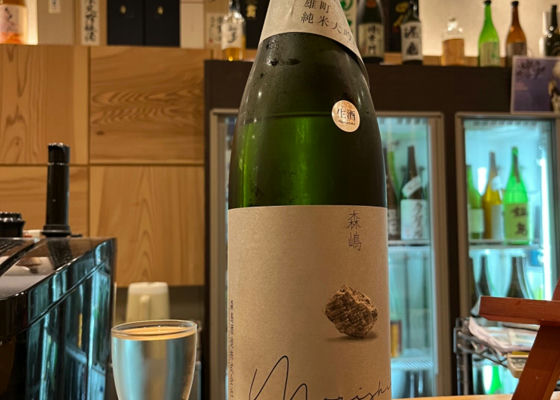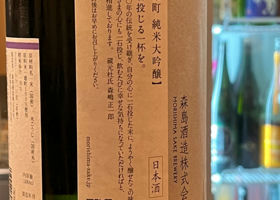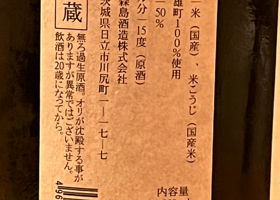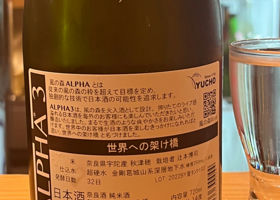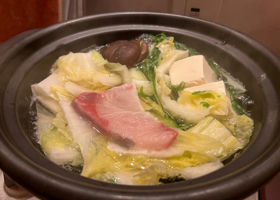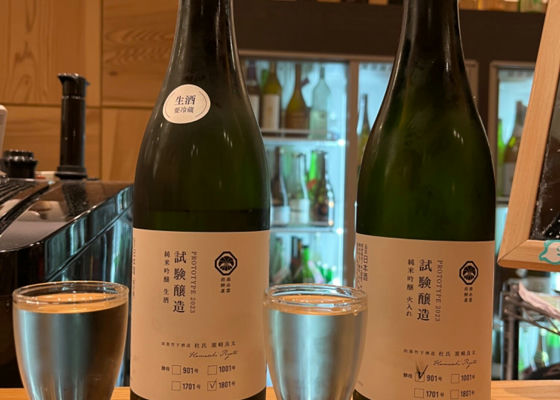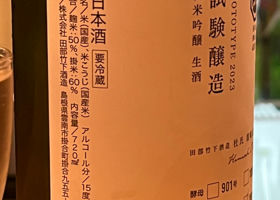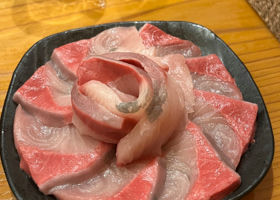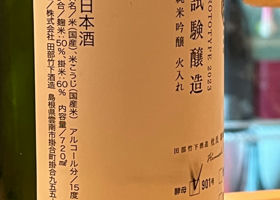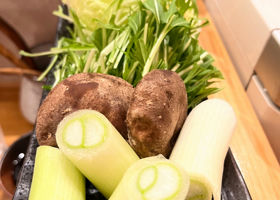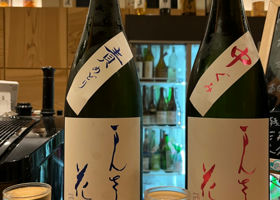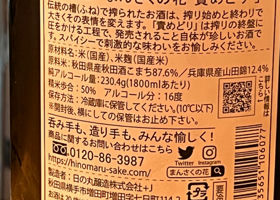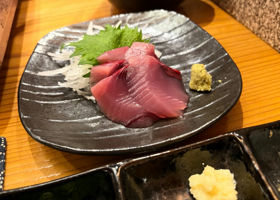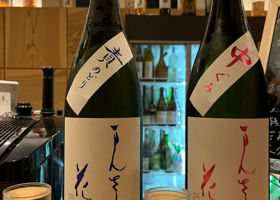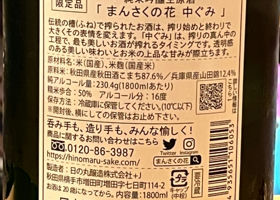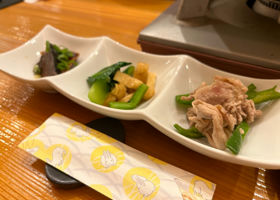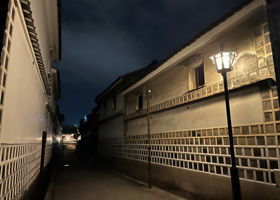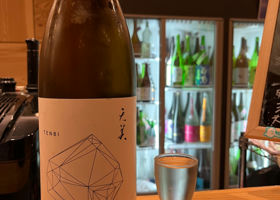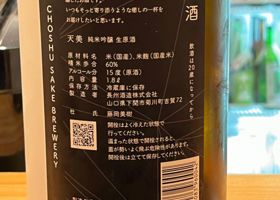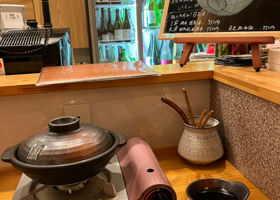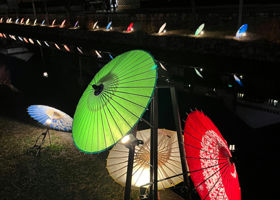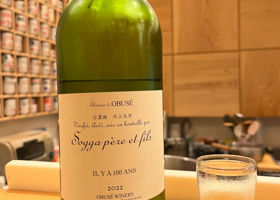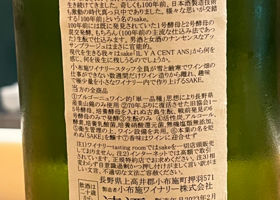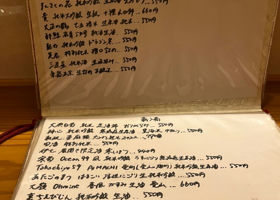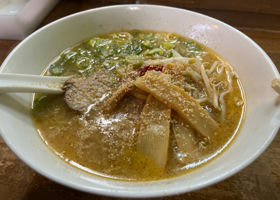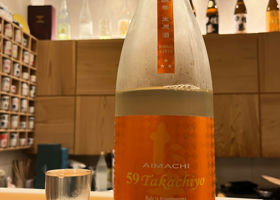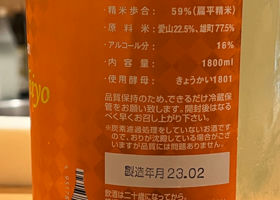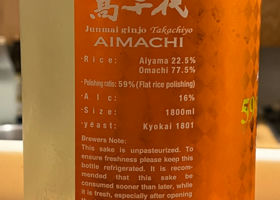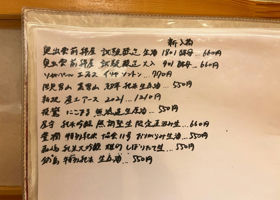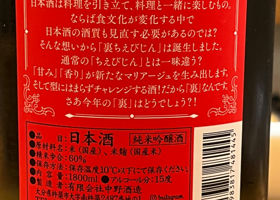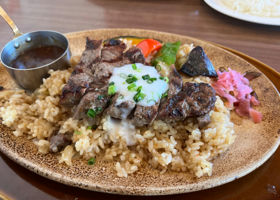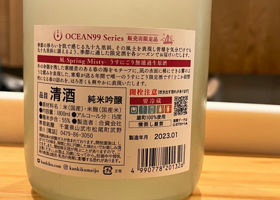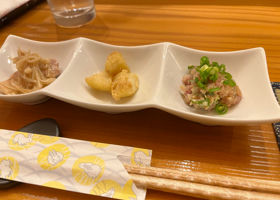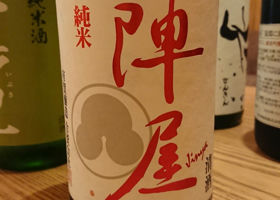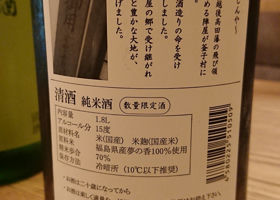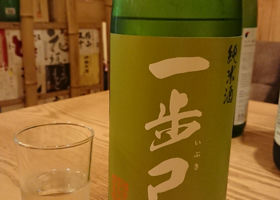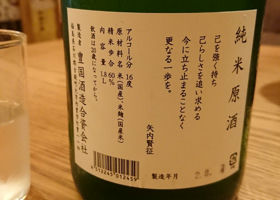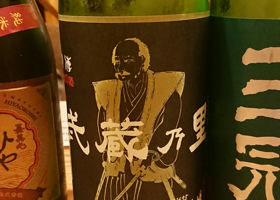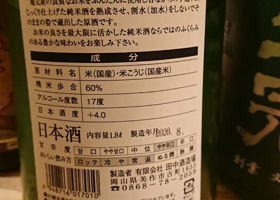Timeline
しんしんSYTonight's seat is the first one on the right side of the counter.
It's the closest to the cold storage room and you can see the bottles very clearly!
As I mentioned at the start of Tenbi, I was really excited to drink as much as I could if there were so many sake to choose from!
Next up was Morishima, a long time no see!
Omachi Shiboritate, just released this month!
Fresh, sweet and delicious!
Junodai for such a great price!
Thank you very much!
extensive knowledge
Morishima's characteristic glossy, shiny, transparent, light mouthfeel and freshness with a slight effervescence.
Exquisite balance of voluptuous flavor with the plump sweetness of Omachi rice!
The sharp aftertaste makes it an excellent food sake.
Specific name: Junmai Daiginjo
Ingredients : Rice, Rice malt
Alcohol content: 15
Sake meter rating: +2.0
Acidity: 1.8
Rice used for making:Omachi
Rice polishing ratio:50
Condition: Nama-shu 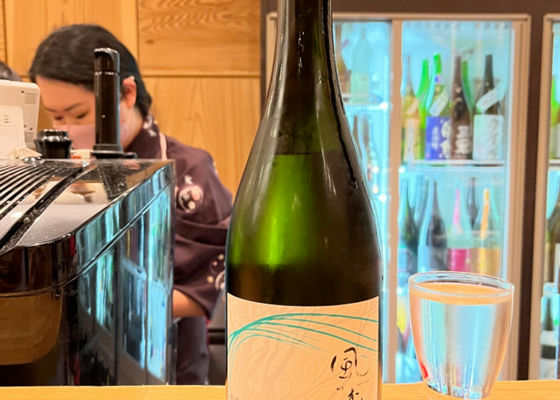
しんしんSYLooking carefully at the cold storage, I found a wind forest, which was not there yesterday, as I recall.
I asked the owner if I could open it.
I asked if I could open it.
The endorsement reads "Alpha 3".
The owner said, "This is fire-roasted.
But it was fruity and delicious beyond my imagination!
I've found a great sake 🍶!
The amberjack shabu-shabu is also great!
extensive knowledge
The ALPHA series is a more innovative lineup that goes beyond the conventional boundaries set by Kaze no Mori and explores new sake possibilities from various angles using creative techniques. ALPHA3 is the only fire-aged sake in the series.
The freshness of the sake on the palate is so surprising that you may wonder if this is a fire-aged sake. It has a lively gaseous sensation that is typical of Kaze no Mori, with a wonderful balance of fruitiness reminiscent of muscat, a slight astringency, and a voluptuous umami flavor, and the sharp acidity finishes off the taste with a clean and crisp finish.
Rice used: "Akitsuho" from Nara Prefecture
Polishing ratio 50%.
Designated Sake, etc. Junmai Daiginjo/Hiirei-shu
Strength 14%. しんしんSYFire-aged Japanese pear
Then how about the raw sake?
What a pineapple 🍍🍍🍍!
Our first test brew!
I'm sure this will be very popular!
We took turns comparing flavors while enjoying the main dish of the evening, yellowtail shabu-shabu!
There was so much of it!
I think I'm going to be full!
a wealth of knowledge
Limited Sake] The aroma is slightly fragrant, fruity, sweet-sour and plump. Voluminous juicy flavor from the petite mouthfeel. It has a moderate bitterness, a soft astringency, and a sweet, dark flavor, which is brought together by the spiciness that is felt above the sake's sake level, and flows down the throat smoothly and crisply.
Alcohol 15
Sake meter degree -1.0
Acidity 1.7
Rice used (Koji) Yamadanishiki (Kake) Yamadanishiki, Shunyo
Polishing ratio (Koji) 50% (Kake) 60 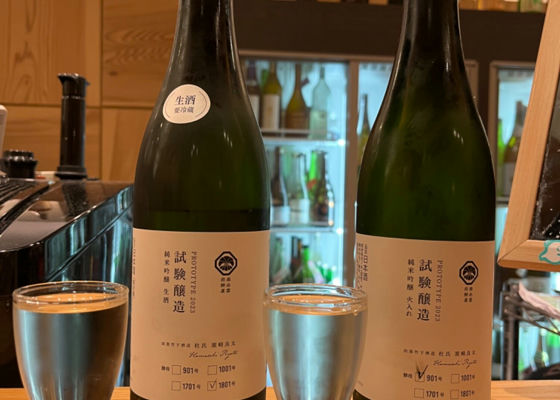
しんしんSYWe were served the sake we had agreed to drink the day before for a comparison!
Tabe Takeshita Sake Brewery in Unnan City, Shimane Prefecture
Hi-ire and Nama-shu
First, let's start with the hi-ire sake!
Fruity like a Japanese pear!
This was the first time I had tasted it, and it was delicious!
The owner also bought a bottle to try it out and decided to see how it reacted in a four-pack bottle instead of a one-pack bottle.
I personally recommend it!
(from the owner's own personal experience)
A fire-aged version of the commemorative first brewed sake
This is a commemorative first-brewed sake produced by Tabe Takeshita Brewery, a new brewery created by the business transfer of Takeshita Honten, a brewery that is also the birthplace of former Prime Minister Takeshita and DAIGO. The brewery's new brewery, Tabe Takeshita Sake Brewery, was established by the business transfer of Takeshita Honten, the brewery from which Yamada Nishiki and DAIGO were born. This is a test brew with high expectations for the future, and is only available now.
The aroma is gentle, but has a beautiful core. The aroma spreads softly in the mouth, followed by the soft sweetness of the rice. The beautiful and elegant umami, with a light dry aftertaste.
Rice used
Yamadanishiki, Shunyo
Rice polishing ratio
50-60
Alcohol content
15 degrees Celsius
Sake degree / Acidity
±0 / 1.7 しんしんSYComparison of Mansaku no Hana
The Nakagumi from earlier has a Japanese pear taste.
This one has a pineapple flavor.
Different malted rice gives different tastes
Sake is so deep!
knowledge
Fruity aroma, juicy sweetness, good with a glass of wine
The "blamed" part is the part that is pressed further after the "Nakatori" part is taken, and is the part with the most intense flavor. It is the last part of the pressing process and has a slightly bitter taste, but it also has a sharp taste.
Ingredient rice: Akita Sake Komachi
Polishing ratio 50%.
Yeast used: UT-2
Alcohol 16%. nitoGood evening, Shin Shin SY.
I didn't know that they have "chugumi" and "blame" in "mansaku no hana". I would like to compare the drinks. 😋 しんしんSYGood evening, NITO-san. Nakagumi, I heard that there is not only blame but also rough running. しんしんSYThe next sake is a comparison of Akita
Mansaku no Hana
The first one is "Nakagumi".
It tasted like a fruity pear!
I have never tasted anything like it in the previous Mansaku no Hana sakes!
We are looking forward to the next one!
extensive knowledge
This is the middle of the "Ara, Naka, and Chukagumi" series, which are junmai ginjo carefully brewed in a small brewing process and separated by the timing of pressing in a traditional tank (fune). This is the one and only popular series that allows you to compare the exact same sake. In the Arabashiri stage, the bags are still coarse and the sake is still lightly cloudy, but the bags gradually become more and more tight and the sake turns clear, which is the sign of "Nakagumi. This is when the most beautiful sake is pressed.
Nakagumi
This is the "middle" of the pressing process. You can enjoy the most stable and beautiful taste.
Ingredients : Akita Sake Komachi, Hyogo Yamadanishiki
Rice polishing ratio : 50%.
Alcohol content : 16 TenbiTENBI 純米吟醸 生原酒純米吟醸原酒生酒 しんしんSYHere we are again today.
Kurashiki Marugen
Studied hard during the day
Blood sugar is dropping.
I saw the blackboard saying there were only a few places left to start, so I went to Tenbi.
White tempura is still delicious!
A great way to start the day!
I'll drink tonight 🍶.
extensive knowledge
Gorgeous and fresh aroma like white grapes, soft sweetness and acidity, and freshness, which can be enjoyed both before and during dinner. Immediately after opening the bottle, it tastes fresh and juicy with a touch of carbonation. After three days from opening, the carbonation is released and the sweetness and flavor increase. Please enjoy the changes after the bottle is opened. It is made to go well with fugu (blowfish), a specialty of Shimonoseki. Sashimi, white fish with ponzu (Japanese sauce made from ponzu citrus juice). It goes well with soup stock and sushi. It also goes well with fruits such as strawberries and muscats.
Rice : Yamadanishiki
Rice polishing ratio : 60
Yeast : No.901
Alcohol content : 15% (undiluted)
しんしんSYWe found Sogapere Efis!
I was curious about it because I had been informed that it had just arrived at a store in Sapporo.
The store there is Numerosis.
Tonight I found Ilya Thornton.
Naturally, it was my first time!
It is dry and crisp, reminiscent of white wine!
The owner, who hails from Kameoka City in Kyoto Prefecture, told us that there are many varieties!
From 1 to 9 (there is no 8)!
And Ilya Thornton is a cross between 1 and 2.
He also told me that there are some that are a mixture of all of them!
I'll have to review that later!
And as we talked, it was almost closing time!
I'll be back!
After leaving the restaurant, I wandered to a ramen shop across the street to fill my stomach!
extensive knowledge
Sogapère Ephis uses a total of eight different yeasts, numbered 1-7 and 9, each with a different name and flavor.
Those using No. 1 yeast are "numero uno".
No. 2 yeast is "Deux
Trois" for No. 3
No. 4 is "Cattle
No. 5 is "Cinqoux
No. 6 is not named like No. 1 to No. 5 and is "numérosis
No. 7 is "Setteux
No. 9 is "Neuf"
Ilya Thornton No. 1 and No. 2 yeast are used TakachiyoTakachiyo 59 CHAPTERIII AIMACHI 愛町あいまち 純米吟醸生原酒純米吟醸原酒生酒 しんしんSYAimachi for the next sake?
A new sake rice that is a cross between Aiyama and Omachi?
No, no, no.
It is a blend of Aiyama and Omachi.
It was also fruity and easy to drink, with a crisp bitterness at the end!
There were no customers, so after looking at the menu, I took my time to take a look at the cold storage!
There it is, the awesome sake!
Sake I didn't even know existed!
I'm looking forward to coming back!
Pour a little bit into a small glass and enjoy the sake you don't know about!
a lot of knowledge
From Takachiyo Shuzo, which brews high quality sake such as "Takachiyo" and "Takachiyo". The new series, "TACHIYO", is an evolution of the series. Takachiyo59" is a new and highly anticipated series that can be considered an evolution of the series. Takachiyo in English or codenamed "Gokutaka (59)" series. This series is an ambitious attempt at daigin-zukuri, brewed with "Association 1801" sake rice from all over Japan and unified at "59%" using the flattened rice polishing technique, which is one of their specialties. CHAPTER III uses Aizan as the Koji rice and Omachi as the Kake rice. CHAPTER III is named "AIMACHI", using Aizan as Koji rice and Omachi as Kake rice, and has a fresh sweet fruity aroma. It finishes with a smooth sweetness, umami, and a full-bodied deliciousness, but with an overall sense of clarity on the palate. しんしんSYPS
Ingredients / Details Aizan, Omachi
Polishing ratio: 59% flat polished rice
Alcohol percentage 16
Sake meter degree ±0
Acidity 1.5 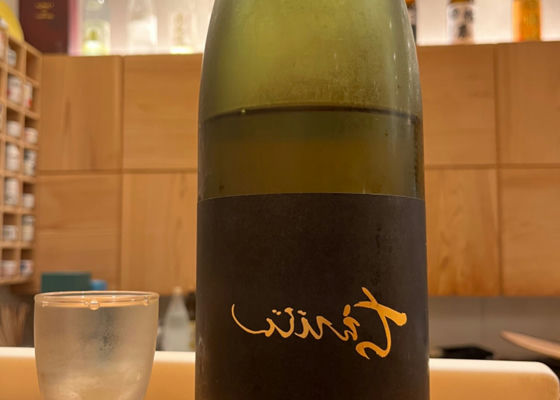
しんしんSYOur neighbor's guest had left, so we had the place to ourselves.
We talked with the owner about the store and Kurashiki while trying our next drinks!
I tried the Ura-chiebijin, which I had never had before!
It was also delicious, delicious, delicious😋!
It's hard to believe it's been 7 years since the restaurant opened.
The white wooden structure creates a bright atmosphere.
The owner is cheerful and funny 🤣.
We promised to visit again tonight and booked the yellowtail shabu shabu course!
We can drink with peace of mind 🍶.
There are so many brands to choose from on the menu!
We had a light lunch, so we only had the appetizer tonight!
extensive knowledge
Urachie", nicknamed "Urachie", is a Japanese word for "Urachiebijin - extra edition". Urachiebijin" is a challenge sake by Nakano Shuzo, the brewer of Chiebijin. Sake is meant to be enjoyed with food to complement it. Then, as the food culture is changing, we need to review the quality of sake as well, don't we? It was with this in mind that "Ura Chiebijin" was born. Is it different from regular Chiebijin? The "sweetness" and "aroma" create a new marriage. The specifications are undisclosed, and the concept is changed every year to evolve year by year.
Type Junmai Ginjo
Alcohol 16
Sake degree -1.0
Rice used: Yamadanishiki 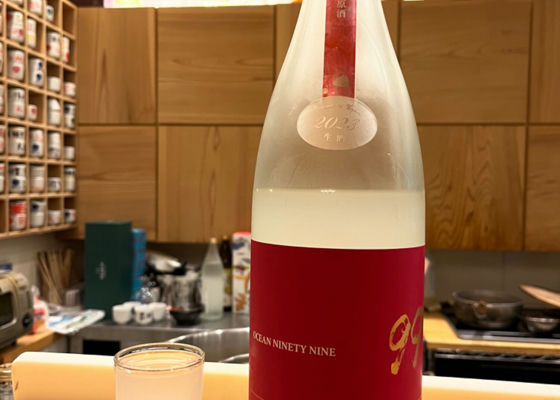
しんしんSYStudy meeting from today
Staying in Kurashiki in advance
Found a sake store near where we are staying!
I opened the door even though the atmosphere was a little difficult to enter 🚪.
We were welcomed with a smile and told to have a seat at the table of our choice!
I had already learned about the large selection of sake on Instagram and Facebook beforehand!
I found a sake that a friend of mine had recently posted about 🍶.
The shocking pink label looks great!
The taste is fruity like pineapple 🍍 as expected!
We came in late and our flight was delayed, so let's have a light drink first.
Knowledge
Specific name: Junmai Ginjo
Ingredients : Rice, Rice malt
Alcohol content: 15
Sake Degree: -4.0
Acidity: 1.4
Rice type:Omachi
Rice polishing ratio:55
Condition: Nama-shu
The motif of this sake is the sea in spring with lingering winter temperatures, and the misty haze that rarely forms on the surface of the water is expressed by the light nigori (misty mist). uuuIt has a nice aroma. It has a sweetness of rice and is gentle. uuuA little dry. But it's easy to drink. RecommendedContentsSectionView.title
